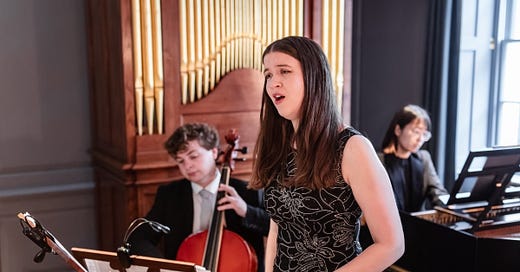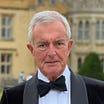An intimate hour in Handel’s old home
The gifted English Concert fellows have a bright future ahead of them.
Stroll on! That’s Harry Bicket mooning around outside Handel’s House, 23 Brook Street, Mayfair. I had never seen the Artistic Director of The English Concert, the go-to ensemble for all things Handel, dressed in mufti. Surprised to learn he owns anything other than a white tie and tails or a smart tux.
I’m there for a Monday Matinee, to be performed by the “inaugural cohort of The English Concert Fellowship”, a programme for recent or about-to-be graduates from music schools in the UK and the US.
I had been encouraged to pick up a ticket by Holly Scrivener, The Concert’s super-sharp, pleasantly insistent, endlessly courteous Head of Development. Post a thorough briefing over coffee at the trendy WatchHouse coffee shop round the corner in Medici Square, we strolled round the corner.
And there he was. The Handel God of the podium, descended to Brook Street earth, looking as unassuming as any of the audience, waiting for the doors to open. Holly made an introduction. I racked my brain. Had I ever written anything snarky about Harry? The last New York outing I reviewed was Handel’s Rodelinda at Carnegie Hall.
What was the headline again? Oh, yes! “Harry Bicket’s Rodelinda Ravishes at Carnegie Hall”. Should be safe enough. Harry was charming and seemed critic-proof. Actually, critic-unaware, thus proof.
Which is a good thing. Steely determination is needed to lead a world class early music ensemble like The English Concert, developing its Fellowship Programme while also embarking on the seemingly impossibly ambitious 2023-launched Handel for All project. Filming every piece of music written by Handel and making it freely available online to the public will be an historic achievement.
Laid back, faintly quizzical, Harry – he had unexpectedly popped along to see how the recital went – is a sane man on a mission. A refreshing contrast to alternative bunny jumping masters of the universe who dominate the Twittersphere with missions to Mars, overwhelming egos and MAGA hats.
Into the Handel House and on to the performance. The Brook Street property is now known as the Handel Hendrix house. Marketeers hang by the fingernails of coincidence to the fact that Jimi Hendrix lived next door to Handel in London’s swinging sixties.
For any dullard readers – surely not? (ed) – by then Handel had been dead for 200 years, so remained largely undisturbed by the serial bonking, drug-fuelled parties, and crockery smashing (or were those guitars?) antics in Jimi’s top floor bedroom, through the wall. My favourite operas were all written at a desk – just over there.
The audience, limited to about 30, filed into the downstairs sitting room, an intimate space running to the back of the house, with two muntin-paned windows looking out onto bustling Brook Street. It was somehow reassuring that the maestro of Baroque magnificence and excess had contrived his dreams in surroundings so mundane.
On filed the artists. Eddie Mead, cello; Louis Moisan, theorbo, Mimoe Todo, harpsichord and Maryam Wocial, soprano. Click the links and check them out. In today’s firmament of musical stars in the making, each shines brightly. Hearing them perform close-up, in Handel’s home was to be a super-special experience.
The programme – which lasted about an hour – featured works by Handel (no surprise there), Charles Burney, a Cello Sonata (Giacobbe Cervetto), Violin Sonata, (Arcangelo Corelli), Marionas by Santiago De Murcia and a closing song by Antonio Caldara, Pompe inutile (Useless Pomp), which addressed the topical matter of the sort of grandees who feel entitled to be kitted out by donors in Saville Row suits being brought down a clothes peg or two.
The clever selection allowed each of the artists to strut their stuff. No super-digital 300-channel recording could come close to experiencing such a concert close-up.
Watching Lois Moisan’s intricate, flawless fingering on the impossible theorbo was thrill enough. Never mind the sound.
Maryam Wocial’s rich voice filled the room to perfection. Easy for a soprano to blow the audience away in such a small space, but she judged it perfectly. We were enveloped in her warm sound world.
Time will tell, but if Mimoe Todo does not become one of the leading harpsichordists of her era, I am a proverbial national of the Netherlands with a finger in the dyke eating endless round of Gouda.
And Eddie Mead’s rendition of the Cervetto Sonata No II in C Major had the easy authority needed to make cello works sing and flow. Sometimes they just seem like clever, hard work.
The everyday parlour atmosphere was heightened by the arrival in Brook Street just before the start of a massive, reversing orange dump truck which filled the right-hand window. As it was reversing to the insistent sound of hazard warning beeps in B flat, I thought it might have been part of the show. It shut up just in time.
Then there was the short, stubbly man in the black bobble hat. He peered in, walked past and then back again. The musicians were, of course, oblivious. I thought he might be looking for Jimi Hendrix. But no, thirty minutes in, he effected entry through the front door. He lurked in the hall until the end. Seems to have enjoyed it.
The project. Handel For All is not just about recordings. It promises to be a burgeoning educational and training space, too. Insight and knowledge shared by leading musicians. Digital and self-led sessions for use in schools and homes. Music Minus One, a library of interactive digital learning materials, will serve an audience from budding professionals to useless drawing room amateurs (me).
The sad truth is that musical education in public sector schools is dead. Not even lessons on the triangle and the tin whistle. The English Concert, true to the spirit of founder, Trevor Pinnock, is determined to give something back, at the same time providing a foundation upon which future audiences will be based.
The roll call for planned releases in 2025 is comprehensive – oratorios and operas; Solomon, Acis &Galatea, Amadigi, and Ariodante. Plus, other choral and instrumental works, including the organ concertos and Part I of the Chandos Anthems.
The ensemble looks westward, too. The English Concert in America (TECA). Twenty four fellows drawn from New York’s Juilliard School’s Historical Performance program have been supported since 2014.
Main stage, Bicket’s Carnegie Hall appearances have become a sell-out fixture in the Manhattan calendar. Handel’s Giulio Cesare, with soprano Louise Alder at Carnegie on 4th May 2025 will be a “must”.
In Brook Street – lorry long gone – post-concert, I chatted to some fellow members of the audience. They were Australian tourists, mildly interested in music, and had stumbled across the event almost by accident. Brimming with enthusiasm, their London visit had been made perfect. As one of them gratuitously opined, “We don’t have a Handel House in Sydney”. Quite.
As for future Matinee Concerts with Fellows, count me in. My hour or so in Handel House last Monday was – in the proper usage of the clichéd adjective – a unique experience.






